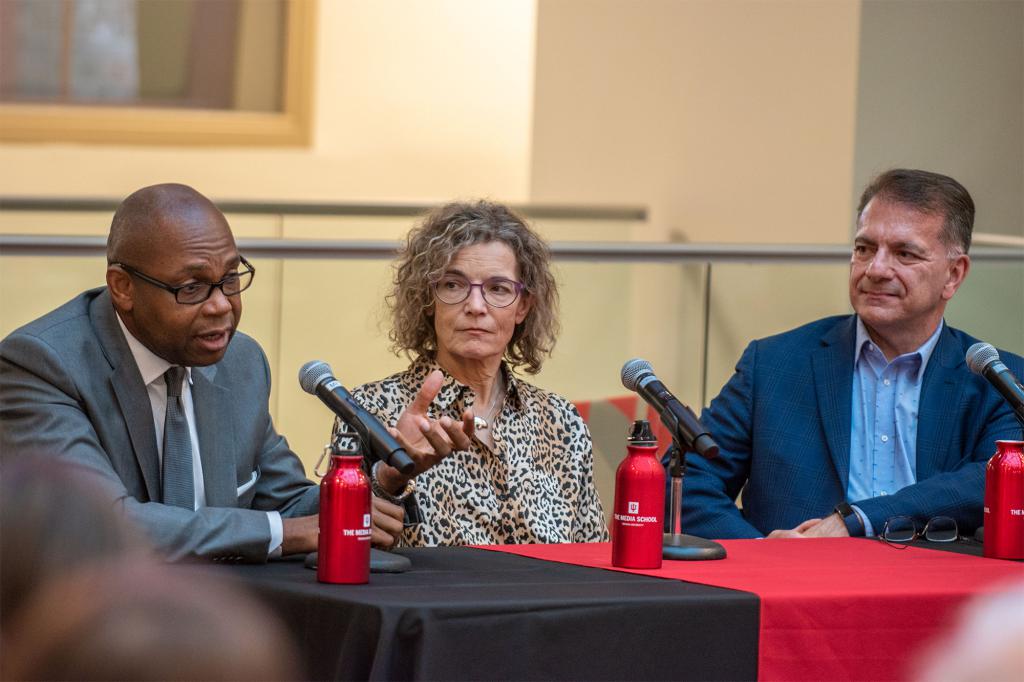Assange case could impact journalists, panel says

Julian Assange is not a journalist, said Kathy Kiely, a veteran reporter with four decades of experience in newsrooms and classrooms. He’s a broker of information, often motivated by his own political interests and rarely adherent to a code of ethics.
When The New York Times published information obtained through WikiLeaks, there were redactions and protections, she said. Journalists combed through the information to find the essentials and exclude information that might harm people.
WikiLeaks published a dump of raw information, including social security numbers and other personal data. There was not the same care for what was essential and what was not.
“It’s important for people to understand that professional journalists do not do the things he did,” she said during a panel discussion Thursday about the Assange case and its implications for journalists.
The panel, The Julian Assange Case: A Threat to Journalism?, brought together Kiely, the Lee Hills chair in free press studies at the University of Missouri; Investigative Reporters and Editors executive director Doug Haddix, MA’90; and Associated Press international investigations editor Ron Nixon to parse complicated issues in media law. It was hosted by The Media School’s Center for International Media Law and Policy Studies and its Barbara Restle Press Law Project, and moderated by the center’s director, associate professor Anthony Fargo.
Nixon said it doesn’t matter whether we label Assange a journalist. Freedom of information laws are vital to everyone, and his antics threaten the future of those laws.
“Publishing information is not just about what we do,” he said. “The issue is: Does his case mean that we could potentially be prosecuted for doing the same things?”
Assange founded WikiLeaks, an international nonprofit organization that publishes leaked and classified information obtained by anonymous sources, in 2006. It claims to have released 10 million documents in its first decade of existence.
The Australian information leaker, who Fargo firmly stated is “not a nice person,” is perhaps best known for leaking information obtained by Chelsea Manning about the war in Afghanistan. Following a rape allegation, Assange holed up in London’s Ecuadorian embassy to avoid extradition to Sweden from 2012 until this April, when his asylum was withdrawn and he was arrested. In May, the U.S. charged Assange with violating the Espionage Act, raising the stakes for his potential extradition to the United States and firmly tying his case to freedom of information law.
Historically, First Amendment law has been shaped by cases involving similarly not-so-nice people, Fargo said. His concern, and the panelists’, is how the Assange case might affect journalists’ ability to report on leaked documents.
There’s a longstanding precedent of journalists being free to publish sensitive or leaked information so long as they’re not the ones actively breaking laws to obtain it, Nixon said. He cited the Pentagon Papers as perhaps the most influential example.
“I think this case would upend that precedent,” he said. “It would potentially open us up for prosecution.”
The panelists envisioned a future for journalism in which legal precedents have changed. The digital age, along with the post-9/11 paradigm shift in surveillance, has already ushered in a new age of journalistic practices.
They talked about burner phones and confidentiality agreements, the ins and outs of encryption and the two-pronged nature of safety — protecting both themselves and their sources. They talked about whether or not to use WhatsApp (don’t) and if we’re headed back to the Deep Throat era when reporters passed notes in parking garages (maybe not, but only because most parking garages have security cameras now).
The panelists also discussed the potential ramifications of the Assange case on common anti-press sentiments.
“My biggest worry is that people will conflate Julian Assange with the press, and then we, the actual press, suffer the consequences of being in that same bucket,” Kiely said. “Just because everybody’s a publisher today doesn’t mean everybody’s a reporter.”
Fargo noted that Assange’s work is predicated on a belief that the press is too timid.
The panelists pushed back against this sentiment. Journalists are hard-working and ethical, they said. Journalists don’t report with political motives. Journalists persist until their stories are bulletproof, and in the rare instance when they aren’t, journalists are transparent.
In publishing mass quantities of information without disposing of potentially harmful personal information, WikiLeaks cements itself as unethical and unjournalistic, Kiely said.
“You’re washing your hands of your responsibility to look through these documents, as The New York Times did, and say ‘This tells a story that’s important, that somebody needs to know about,’” she said.
The increased prevalence of intentionally false information makes journalistic responsibility even more crucial, they said. Deepfakes — video technology that allows people to recreate people’s faces so accurately that the viewer often can’t tell the difference — will be used in the next election cycle, Haddix warned. It’s a difficult time for journalists and the public to confront the mass amounts of false information masquerading as true.
In much the same way that Nixon argued that freedom of information laws are not just for journalists, Kiely reminded listeners that neither is journalistic thinking. She shared a classic newsroom adage: If your mother says she loves you, check it out. It’s important to question and double check everything, especially the information we want most badly to be true.
“What media literacy is is thinking like a journalist,” she said.

